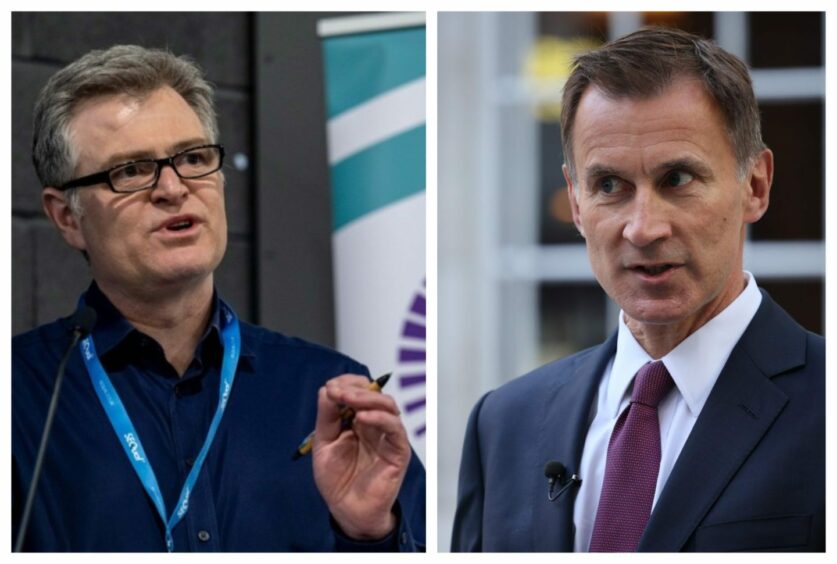
Energy representatives have asked for a ‘holistic’ approach to energy policy and tax incentives in the upcoming Budget, which would help guide the UK to net-zero.
Citing the estimated costs of transition at around £1.4 trillion, trade body Offshore Energies UK (OEUK) pressed for a “homegrown energy transition” which it says would protect jobs and boost sustainability.
In a January letter sent to Chancellor Jeremy Hunt ahead of his Spring Budget – set to be unveiled on 6 March – the organisation repeated calls made ahead of October’s Autumn Statement for a raft of fiscal and regulatory reforms to create an “irresistible investment environment” across the energy sector.
Chief executive David Whitehouse again pressed for a cross-party debate on the future of the oil and gas industry’s ring-fence tax burden, which it urges “must be reduced from 75% to an appropriate rate that delivers a fair return for industry and HM Treasury.”
The right rate
Taking aim at the ongoing impact of the Energy Profits Levy (EPL), the letter notes that higher commodity prices are now “dissipating”.
“It is critical that fiscal policy recognises this and avoids prolonged one-off taxes targeted at past events to ensure the UK is competitive,” the missive states.
Speaking with Energy Voice, OEUK sustainability director Michael Tholen said: “The reason the windfall tax was there in the first place is diminishing. It was a one-off tax shaped for a specific time-bound thing, so we’ve now got to get a long-term regime in place.
“Do I think 75% is the right rate long term – I’m not wedded to that. Do I expect it to be a higher rate than 40? Yes, I do.”
Mr Tholen was speaking prior to Labour’s manifesto announcement late last week in which it proposed a hike in the rate, from 75% to 78%, and a pledge to close windfall tax “loopholes”.
On Friday OEUK warned that thousands of jobs and billions of pounds of investment would be “wiped out” under Labour plans to increase the windfall tax.
In its letter, OEUK said any future rate must reflect the maturing nature of the basin, the cyclical nature of costs and the need for all industries to pay fair taxation.
“What our broader sector does is something which relies on long term solutions to long term problems. Time-bound, short-term windfall taxes just don’t fit that sort of context, because there’s a huge competition for investment in Europe and around the world,” Mr Tholen added.
It follows warnings last year by Aberdeen and Grampian Chamber of Commerce that the policy had made the North Sea “uninvestible” for many firms.
Acknowledging the addition of new price floor measures enacted last year, OEUK has asked the Chancellor to add CPI-linked EPL “triggers” into legislation “as soon as the parliamentary timetable allows” – which it says will unlock additional borrowing capacity and support investment decisions.
‘Depoliticising’ energy policy
Echoing other business representatives, it has also called for an independent statutory body with the powers and resource to oversee the delivery of UK energy objectives and net zero commitments.
Likened to a Bank of England for energy policy, this governing body would be charged with developing recommendations which could command cross-party consensus and insulate the sector from political policy shocks in the future.
Mr Tholen contrasted the role with that of the Climate Change Committee, which advises government, but said this body could actually provide further guidance across the energy and policy landscape concerned.
This would “depoliticise the decision making where possible and really focus on outcomes,” he ventured.
“What we need covers not just my part of the energy sector. If we’re going to get £1.4 trillion invested over the next decades we need some way to call the shots without everyone swinging left and right, up and down,” he said.
Holistic approach
OEUK also call for the decarbonisation investment mechanism added to the EPL to become a permanent feature of the ring-fence tax regime, and for further consideration of “special rate assets” to incentivise spending in manufacturing and infrastructure.
In support of that the sector is seeking a strategic approach to meet the UK’s infrastructure requirements, with measures including upgrading ports, transmission systems storage, and other key equipment.
Mr Tholen said a holistic approach to energy and investment policy would help support schemes like INTOG which link offshore wind and oil and gas.
“To invest in the electrification of offshore assets – those aren’t simply wind turbines sitting alongside an oil and gas platform and nothing else.
“These are typically much larger wind farms, some of which goes into the oil and gas facility, the rest of which goes to the coast as low-carbon electricity.
“You’re looking at solutions where you’ll see oil and gas facilities help to carry parts of that investment and get it over the line. Creating energy hubs that play into both needs as part of a bigger story is very important.
“We’ve got to look at things in the round rather than isolation.”
Notably, the Spring Budget will arrive months, potentially weeks, before an impending general election – something the organisation is keenly aware of. Yet Mr Tholen he is hopeful nonetheless that the sector will secure some recognition of the need for long-term certainty through that cycle.
“It is a competitive world we’re in,” Mr Tholen adds.
“We need to get back to long-term fiscal solutions to allow us to be part of a long-term solution to the energy transition and industrial growth. Any words which recognise that would be brilliant.”
Recommended for you

 © Supplied by OEUK
© Supplied by OEUK